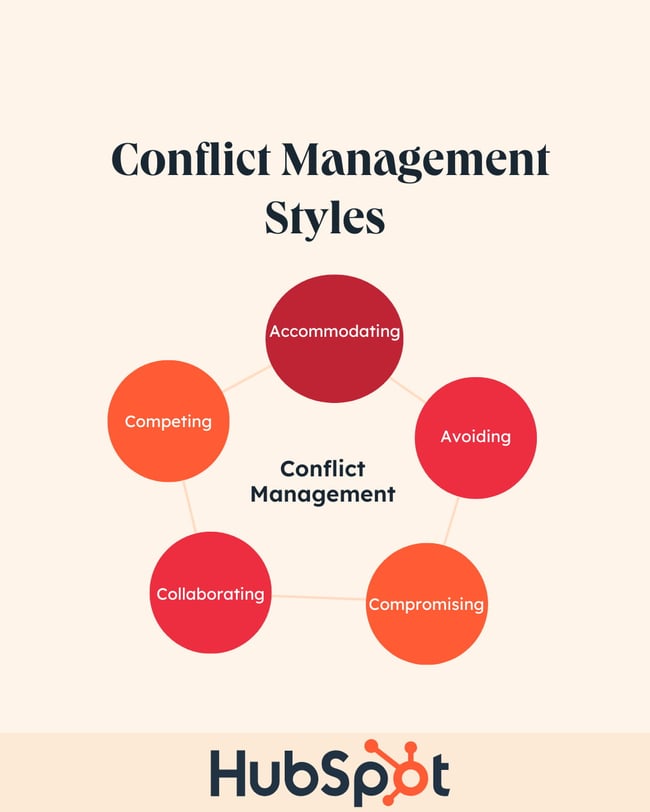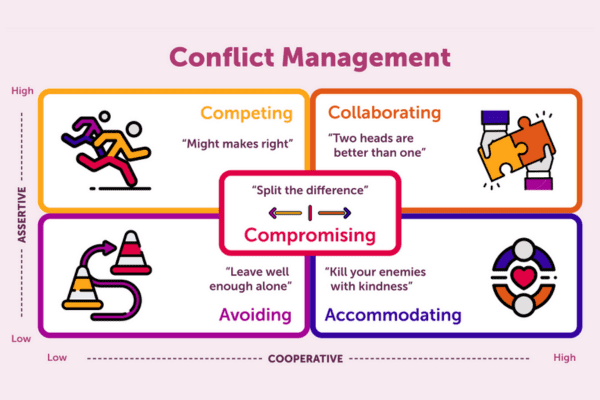
Ease Tension: 5 Conflict Management Tips
April 18, 2024Discover 5 surprising conflict management tips that will effortlessly diffuse tension and bring harmony back into your relationships.

Image courtesy of Karolina Grabowska via Pexels
Table of Contents
Introduction: Unknotting the Ties of Tension
Conflicts and disagreements are a natural part of life. It’s normal for people to have different opinions and ideas, which can sometimes lead to tension. But how we handle these disagreements can make a big difference in the health of our relationships. Learning to manage conflicts in a positive way is essential for keeping friendships and relationships strong and happy. So, let’s dive into some tips on how to ease tension and foster healthy relationships.
When we find ourselves in the midst of a disagreement, it’s important to remember that conflict doesn’t have to be a bad thing. In fact, it can be an opportunity for growth and understanding. By approaching conflicts with an open mind and a willingness to find common ground, we can navigate through them in a way that strengthens our relationships.
Throughout this blog, we will explore practical strategies to help you handle conflicts and disagreements with grace, empathy, and effective communication. By incorporating these tips into your relationships, you can build trust, promote healthy communication, and ultimately create stronger and more fulfilling connections with those around you.
Be a Detective: Understand the Problem
Conflicts and disagreements are bound to happen in any relationship. It’s normal for people to have different ideas and opinions. But the key to keeping friendships and relationships healthy is knowing how to handle these disagreements in a positive way.
Ask Questions
When you find yourself in a conflict or disagreement with someone, it’s important to be like a detective. Ask questions to truly understand what the problem is all about. By asking questions, you can get to the root of the issue and find a solution that works for both parties.
Listen
Listening is just as important as talking when it comes to understanding a problem. Make sure to listen carefully to what the other person is saying. This shows that you value their perspective and are willing to work towards a resolution together.
Use Your Words Wisely: Healthy Communication
Talking about how you feel and using kind words can make a big difference when it comes to resolving conflicts. Healthy communication is key to maintaining strong and happy relationships.

Image courtesy of blog.hubspot.com via Google Images
Keep it Kind
It’s important to remember to stay respectful, even when you disagree with someone. Using kind words and a gentle tone can help keep the conversation positive and productive. Being kind shows that you care about the other person’s feelings and are willing to work towards a solution together.
Share Your Feelings
Instead of blaming the other person for how you feel, try to explain your emotions in a calm and clear way. Sharing your feelings openly can help the other person understand where you’re coming from and can lead to a deeper understanding of the situation. It’s okay to express your emotions, just make sure to do it in a constructive and non-confrontational manner.
Walk in Their Shoes: Try to Understand the Other Side
When you find yourself in a disagreement with someone, it’s important to take a moment and try to see things from their perspective. Imagine what they might be thinking or feeling about the situation. By putting yourself in their shoes, you can better understand where they are coming from and why they feel the way they do.
Show You Care
Showing that you care about the other person’s feelings can go a long way in resolving conflicts. Let them know that you understand their point of view and that you are willing to listen and work together to find a solution. This act of empathy and understanding can help build trust and strengthen your relationship with the other person.
Find the Middle: Working Toward Compromise
When conflicts arise, it’s important to work together to find a solution that everyone can agree on. This often involves compromise, which means giving a little on both sides to reach a resolution. Here are some tips on how to find the middle ground:

Image courtesy of www.makingbusinessmatter.co.uk via Google Images
Suggest Ideas
One way to work towards compromise is to suggest different ideas that could potentially solve the problem. Brainstorming together can help generate creative solutions that satisfy everyone involved. Remember, it’s about finding a solution that works for all, not just one person.
Choose Together
Once ideas are on the table, it’s crucial to make the final decision together. This ensures that everyone has a say in the outcome and feels like their opinions are valued. By choosing together, it strengthens trust and mutual respect in the relationship.
Tip 5: Make a Plan: How to Move Forward
Once you and the other person have found a compromise, it’s essential to make a plan to prevent the same conflict from happening again. By taking proactive steps, you can strengthen your relationship and build trust with each other.
Set Rules
Setting clear rules and boundaries can help prevent future misunderstandings and conflicts. When both parties know what is expected of them and understand the consequences of breaking the rules, it creates a sense of security and trust in the relationship. These rules should be fair to everyone involved and should be agreed upon together.
Keep Talking
Healthy relationships are built on open and honest communication. Even after resolving a conflict, it’s crucial to keep talking and checking in with each other regularly. By discussing your thoughts, feelings, and concerns openly, you can address any issues before they escalate into bigger conflicts. Remember, communication is the key to maintaining a strong and trusting relationship.
Conclusion: Tie It All Together
Managing conflicts in relationships is an essential skill that can help keep friendships and partnerships strong and healthy. By following the tips outlined above, you can navigate disagreements with grace and understanding, ultimately strengthening your connections with others.
Remember the Importance of Compromise
Compromise is a key ingredient in resolving conflicts. By finding a middle ground that works for everyone involved, you demonstrate respect for others’ perspectives and show a willingness to work together towards a solution.
Healthy Communication is Key
Using kind words, sharing your feelings, and actively listening are all vital components of healthy communication. By communicating effectively, you can express your thoughts and emotions while also showing empathy and understanding towards others.
Build Trust Through Understanding
Walking in someone else’s shoes and showing that you care about their feelings can help build trust in relationships. By demonstrating empathy and consideration for others’ viewpoints, you foster a sense of mutual respect and understanding.
Make a Plan for the Future
Once a compromise is reached, it’s important to make a plan to prevent the same conflicts from recurring. Setting clear rules and maintaining open lines of communication can help ensure that everyone stays on the same page and that relationships continue to thrive.
By incorporating these conflict management tips into your interactions with others, you can create stronger, happier, and more fulfilling relationships that withstand the test of time. Remember, conflicts are a natural part of life, but how we handle them can make all the difference in building and maintaining healthy relationships.









